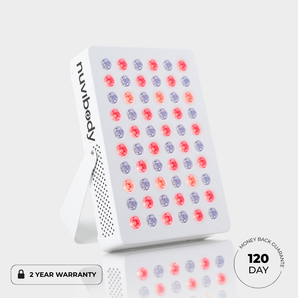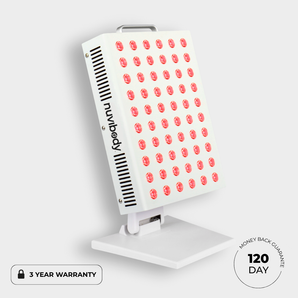Our cells contain small but powerful organelles responsible for providing our bodies with energy: mitochondria. These "energy factories" of the cell play a crucial role in our overall health and functioning. Unfortunately, mitochondrial performance declines as we age, which can lead to decreased energy levels, fatigue, and an increased risk of various health problems. Fortunately, there are several ways to support the health of our mitochondria. One of these is through supplements specifically aimed at improving their function.
But which supplements are truly effective for mitochondrial health? And how can you best combine them with other methods, such as red light therapy , to optimize your energy levels? In this article, we discuss the scientific evidence behind the best supplements for mitochondrial health.
What are mitochondria and why are they important?
Mitochondria are responsible for producing ATP (adenosine triphosphate), the primary energy source required for virtually every cellular function in our body. Besides their role in energy production, mitochondria are also involved in regulating the cell cycle, controlling cellular metabolism, and initiating apoptosis (programmed cell death). Because they are so crucial to cellular health, supporting mitochondrial health can improve the body's overall functioning, from energy production to immune function and the aging process.

The role of supplements in mitochondrial health
Several nutrients and supplements can help support mitochondrial function. Below, we discuss some of the most researched and effective substances.
1. Coenzyme Q10 (CoQ10)
CoQ10 is a powerful antioxidant that occurs naturally in our bodies and plays a key role in mitochondrial energy production. It's often used to boost energy levels, promote heart health, and slow the aging process. CoQ10 helps mitochondria produce ATP and protects cells from free radical damage, which is important for maintaining healthy mitochondrial function. As we age, CoQ10 levels decrease in our bodies, so supplementation can help improve energy levels and overall health.
2. L-carnitine
L-carnitine is an amino acid that helps transport fatty acids into the mitochondria, where they are converted into energy. It plays a key role in increasing fat burning and improving overall mitochondrial function. L-carnitine is often used by athletes and those looking to boost their energy levels, especially during intense workouts. It's also a popular supplement for those experiencing fatigue or muscle weakness, as it can improve cellular energy production.
3. Alpha-lipoic acid
Alpha-lipoic acid (ALA) is a powerful antioxidant that is both water- and fat-soluble, enabling it to neutralize free radicals in various parts of cells. It plays a crucial role in protecting mitochondria from oxidative damage. ALA may also aid in the regeneration of other antioxidants in the body, such as vitamins C and E. Studies suggest that ALA may help improve energy production in mitochondria and protect cells from damage common with aging ( source ).
4. Magnesium
Magnesium is an essential mineral that plays a role in hundreds of biochemical reactions in the body, including energy production. It helps activate ATP, the primary energy source for cells, and plays a key role in regulating mitochondrial function. A magnesium deficiency can lead to fatigue, muscle cramps, and other health problems. Supplementing with magnesium can help improve mitochondrial function, resulting in increased energy levels and improved overall health.
5. Vitamin B complex
The B vitamins, including B1, B2, B3, B5, B6, B7, B9, and B12, are essential for healthy mitochondrial function. They help convert food into energy and are involved in the production of ATP. Vitamin B12, in particular, is crucial for the health of the nervous system and cellular energy production. A deficiency in B vitamins can lead to fatigue, difficulty concentrating, and other neurological complaints. It is important to get enough B vitamins from your diet or supplements to support mitochondrial health.
Combining supplements with other methods
While taking the right supplements is an important step in supporting mitochondrial health, it can be even more effective when combined with other methods. One of the most popular complementary treatments for promoting mitochondrial function is red light therapy . Red light therapy directly stimulates the mitochondria by applying specific wavelengths of light, which can lead to increased ATP production and improved energy levels. It can also help reduce inflammation , accelerate recovery processes, and improve overall cellular health.

By combining red light therapy with the supplements mentioned above, you can support your mitochondrial health in several ways while simultaneously increasing the overall effectiveness of your treatment routine. Using a high-quality red light therapy device , such as the one from Nuvibody, can be a valuable addition to your health regimen and helps you optimally stimulate energy production in your cells.
The importance of a holistic approach
Mitochondrial health isn't something you can improve with just one approach. Combining different approaches, such as supplements, a healthy diet, regular exercise, and therapies like red light therapy , can help you take full advantage of the energy and vitality your body has to offer. It's important to experiment with what works best for you and be consistent in your approach.
Frequently asked questions and answers
1. What are mitochondria and why are they important for my health?
Mitochondria are the powerhouses of our cells, responsible for producing ATP (adenosine triphosphate), the primary energy source for virtually every cellular function. They also play a key role in regulating the cell cycle, controlling metabolism, and initiating programmed cell death (apoptosis). Healthy mitochondria are essential for energy levels, the immune system, and maintaining good overall health.
2. What are the best supplements for mitochondrial health?
There are several supplements that have been proven effective in supporting mitochondria:
- Coenzyme Q10 (CoQ10) : A powerful antioxidant that aids in ATP production and protects cells from free radical damage.
- L-carnitine : Helps transport fatty acids into mitochondria for energy production.
- Alpha-lipoic acid (ALA) : Protects mitochondria from oxidative damage and supports the regeneration of other antioxidants in the body.
- Magnesium : Essential for ATP activation and supports mitochondrial function.
- Vitamin B complex : Helps convert food into energy and plays a role in the production of ATP.
3. How does CoQ10 help with mitochondrial health?
CoQ10 is essential for energy production in mitochondria. It helps generate ATP and protects cells from free radical damage, which promotes overall mitochondrial function. Since CoQ10 levels in our bodies decline as we age, supplementation can help improve energy and slow the aging process.
4. What is the role of L-carnitine in mitochondrial function?
L-carnitine plays a crucial role in transporting fatty acids into the mitochondria, where they are converted into energy. This makes L-carnitine particularly useful for increasing fat burning and improving overall mitochondrial function. It is often used by people looking to boost their energy levels, such as athletes, and by those experiencing fatigue or muscle weakness.
5. Why is magnesium important for mitochondria?
Magnesium is involved in hundreds of biochemical reactions in the body, including ATP production. It helps activate ATP and supports mitochondrial function. Magnesium deficiency can lead to fatigue and muscle cramps, so adequate magnesium is essential for proper energy production.
6. What is the relationship between Alpha-lipoic acid (ALA) and mitochondrial health?
Alpha-lipoic acid is a powerful antioxidant that is both water- and fat-soluble. It protects mitochondria from oxidative damage, a common problem with aging. ALA can also help regenerate other antioxidants, such as vitamins C and E, and improve mitochondrial energy production, contributing to better overall health and vitality.
7. How can vitamin B complex support my mitochondria?
The B vitamins play a key role in converting food into energy and supporting ATP production. Vitamin B12, in particular, is essential for the health of the nervous system and cellular energy production. A B vitamin deficiency can lead to fatigue, difficulty concentrating, and other health problems.
8. Can I combine supplements with other treatments for mitochondrial health?
Yes, combining supplements with other treatments like red light therapy can increase their effectiveness. Red light therapy directly stimulates mitochondria by applying specific wavelengths of light, which can lead to increased ATP production and improved energy levels. It can also help reduce inflammation and accelerate recovery. Using a red light therapy device can be a valuable addition to your supplement routine.


















